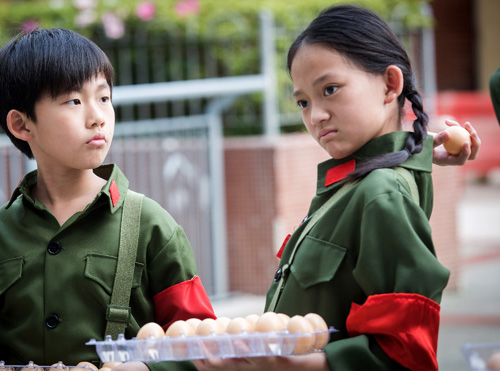INSIDE:
NEWS/STORIES/ARTICLES
Book Reviews
Columns/Opinion/Cartoon
Films
International
National
NW/Local
Recipes
Special A.C.E. Stories
Sports
Online Paper (PDF)
CLASSIFIED SECTION
Bids & Public Notices
NW Job Market
NW RESOURCE GUIDE
Archives
Consulates
Organizations
Scholarships
Special Sections
Upcoming
The Asian Reporter 19th Annual
Scholarship & Awards Banquet -
Thursday, April 20, 2017
Asian Reporter Info
Contact Us
Subscription Info. & Back
Issues
ASIA LINKS
Currency Exchange
Time Zones
More Asian Links
Copyright © 1990 - 2016
AR Home

Where EAST meets the Northwest
|
DYSTOPIAN FUTURE. In this undated scene from the Hong Kong movie Ten Years, a schoolgirl who is a member of a Red Guard-like neighborhood patrol group prepares to throw an egg at a shop. Made on a shoestring budget, Ten Years became a surprise hit with Hong Kong audiences for its dystopian view of the former British colony’s future under Beijing’s rule. (Andy Wong/Ten Years via AP) From The Asian Reporter, V26, #7 (April 4, 2016), pages 2 & 4. Film’s dark vision of future Hong Kong unsettles Beijing By Kelvin Chan The Associated Press HONG KONG — It’s the Hong Kong movie Beijing doesn’t want you to see. Made on a shoestring budget, Ten Years became a surprise hit with local audiences for its dystopian view of the former British colony’s future under Beijing’s rule. The filmmakers imagine a Hong Kong in which protesters set themselves on fire, political assassinations are used to scare the population into supporting repressive laws, and children are enlisted as neighborhood political watchdogs reminiscent of Mao’s Red Guards. The film, an anthology of five short stories, each by a different director, has provoked widespread discussion and raised the ire of Beijing, with China’s Communist Party newspaper Global Times denouncing the film as "absurd." It was a hit at the box office, earning more than 6 million Hong Kong dollars ($770,000), or more than 10 times its budget. But it abruptly disappeared from cinemas in January after an eight-week run, leading many to wonder whether pressure from Beijing was responsible. Now the only way to see it is at private screenings at universities and community centers, where it’s often followed by a panel discussion with the filmmakers. It screened at about 30 Hong Kong venues on April 1. Ten Years depicts Hong Kong a decade from now, more than halfway through a promised 50-year period in which civil liberties such as freedom of speech will remain intact as the city transitions from British to Chinese rule. Executive producer Andrew Choi said the project began two years ago, before pro-democracy street protests over Beijing’s plans to restrict elections gripped the city for more than two months. "We wanted to do a movie about Hong Kong. Unfortunately, Hong Kong became very political in every way. So our topic has to involve the current situation in Hong Kong," Choi said after one recent screening of Ten Years organized by local pro-democracy politicians. "I think the movie kind of hit some of the feelings for most of the Hong Kong people." The film comes at a time of increasing anxiety about Beijing’s influence. Such fears were highlighted by the disappearances of five men linked to a publisher specializing in juicy but hastily written titles about Chinese elite politics and by a violent clash in February between protesters and police who had cracked down on vendors selling fishballs, a holiday delicacy. In Dialect, a taxi driver struggles with a Mandarin proficiency requirement, reflecting nervousness among Cantonese-speaking residents about the influx of mainlanders. Another segment has a woman who sets herself on fire in support of independence for Hong Kong — a cause that might have been unimaginable a few years ago but now is advocated by a number of radical groups. The movie’s final story, Local Egg, revolves around Chinese censorship in the form of schoolkids patrolling neighborhoods on the lookout for banned words. Social worker Thomas Choi, 36, said attempts to stop the movie from being seen would backfire. He said he became interested in the movie after reading comments online. "Even though it’s set in 2025, the producers and filmmakers are talking about something that’s happening now." Read the current issue of The Asian Reporter in its
entirety!
|

